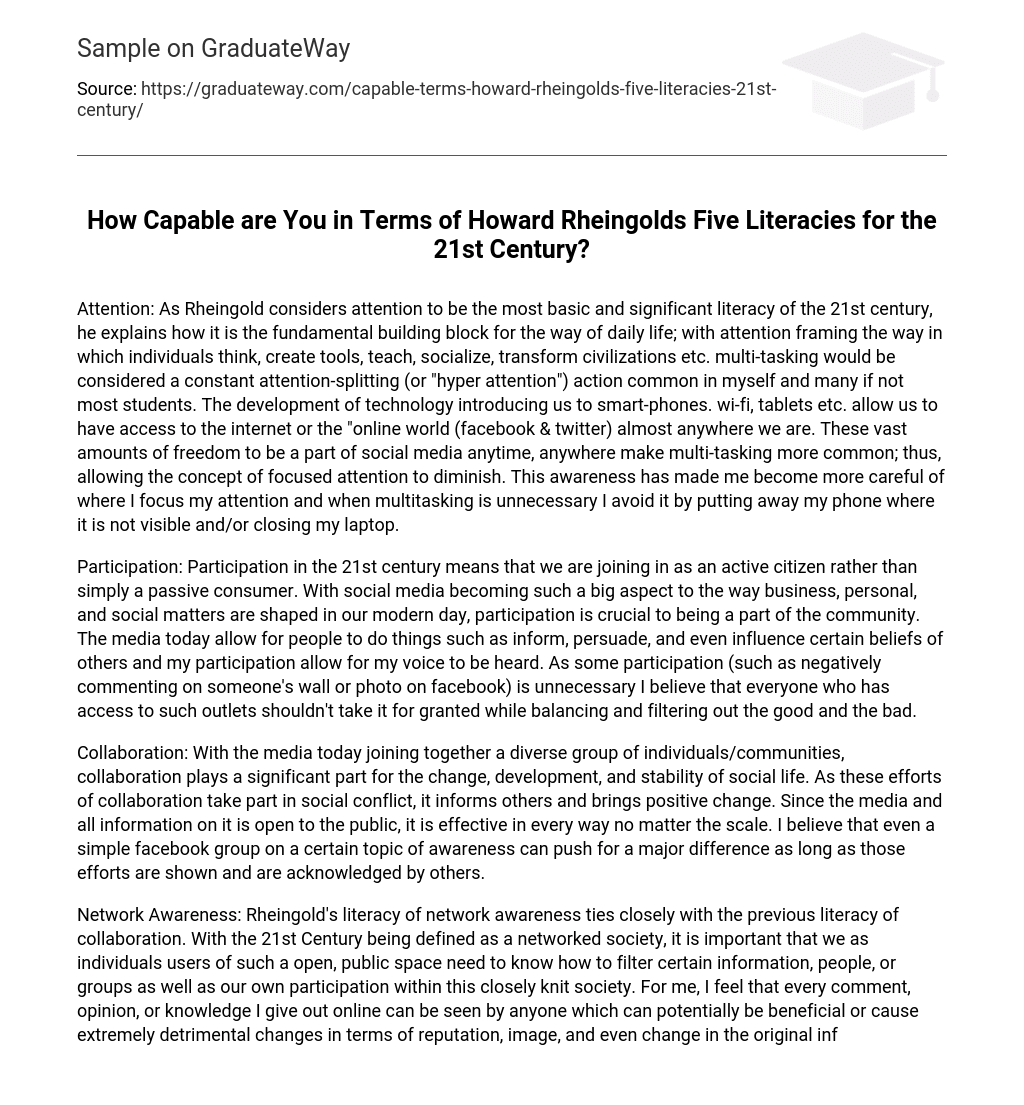Attention: As Rheingold considers attention to be the most basic and significant literacy of the 21st century, he explains how it is the fundamental building block for the way of daily life; with attention framing the way in which individuals think, create tools, teach, socialize, transform civilizations etc. multi-tasking would be considered a constant attention-splitting (or “hyper attention”) action common in myself and many if not most students. The development of technology introducing us to smart-phones. wi-fi, tablets etc. allow us to have access to the internet or the “online world (facebook & twitter) almost anywhere we are. These vast amounts of freedom to be a part of social media anytime, anywhere make multi-tasking more common; thus, allowing the concept of focused attention to diminish. This awareness has made me become more careful of where I focus my attention and when multitasking is unnecessary I avoid it by putting away my phone where it is not visible and/or closing my laptop.
Participation: Participation in the 21st century means that we are joining in as an active citizen rather than simply a passive consumer. With social media becoming such a big aspect to the way business, personal, and social matters are shaped in our modern day, participation is crucial to being a part of the community. The media today allow for people to do things such as inform, persuade, and even influence certain beliefs of others and my participation allow for my voice to be heard. As some participation (such as negatively commenting on someone’s wall or photo on facebook) is unnecessary I believe that everyone who has access to such outlets shouldn’t take it for granted while balancing and filtering out the good and the bad.
Collaboration: With the media today joining together a diverse group of individuals/communities, collaboration plays a significant part for the change, development, and stability of social life. As these efforts of collaboration take part in social conflict, it informs others and brings positive change. Since the media and all information on it is open to the public, it is effective in every way no matter the scale. I believe that even a simple facebook group on a certain topic of awareness can push for a major difference as long as those efforts are shown and are acknowledged by others.
Network Awareness: Rheingold’s literacy of network awareness ties closely with the previous literacy of collaboration. With the 21st Century being defined as a networked society, it is important that we as individuals users of such a open, public space need to know how to filter certain information, people, or groups as well as our own participation within this closely knit society. For me, I feel that every comment, opinion, or knowledge I give out online can be seen by anyone which can potentially be beneficial or cause extremely detrimental changes in terms of reputation, image, and even change in the original information that one decides to share in their own words. Rheingold brings up the question who will control the freedom to innovate online? From personal experience, I believe that everyone has their own freedom to innovate online which brings both negative and positive results; resulting in the notion that most information in the media cannot be fully trusted unless otherwise proven.
Critical Consumption: My last thought that was given in the previous literacy also contends to critical consumption, the literacy of trying to figure out what and who is trustworthy or not online. Personally, I am very picky in terms of reading certain information online and figuring out whether is it legitimate or not. Figuring this out can be very time consuming and sometimes the legitimacy of the certain information is unknown even after research. How I work with this is to just learn to ignore certain things that are insignificant, related to myself, my interests, or a certain topic that I am searching for.





